| Srl | Item |
| 1 |
ID:
082903
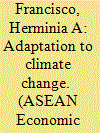

|
|
|
|
|
| Publication |
2008.
|
| Summary/Abstract |
This paper focuses on the adaptation strategies of developing countries and the possible adaptation options available for Southeast Asia. Adaptation refers to the actions taken by individuals, communities, or governments in response to climate change, to reduce the adverse impacts or to take advantage of opportunities offered by such changes. Adaptation strategies have hardly been considered by many Southeast Asian countries in as recently as two or three years ago. The cost of adaptation and the funding available is also discussed, with the possibility of using institutions for risk sharing (disaster management) and risk transfer (insurance and derivatives) as measures to adapt. A regional outlook for adaptation for Southeast Asia concludes the paper
|
|
|
|
|
|
|
|
|
|
|
|
|
|
|
|
| 2 |
ID:
088793
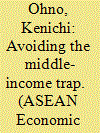

|
|
|
| 3 |
ID:
088794


|
|
|
| 4 |
ID:
082902


|
|
|
| 5 |
ID:
088797


|
|
|
| 6 |
ID:
082901
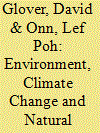

|
|
|
| 7 |
ID:
088796


|
|
|
| 8 |
ID:
082905


|
|
|
|
|
| Publication |
2008.
|
| Summary/Abstract |
In 2005, the Indonesian government implemented a massive fuel price increase. While the benefits of the reform on efficiency grounds have been widely acknowledged, there is still debate about whether the reform was equitable. That question is answered in this paper using a Computable General Equilibrium (CGE) model with disaggregated households that allows for a rich and accurate distributional story. Analysis of various counter-factual scenarios analysis of the reform is carried out. It suggests that the reform could have been progressive if it increased only vehicle fuel prices. However, it tends to increase inequality especially in urban areas when the price of domestic fuel (kerosene) is also increased. Proper and effective compensation is important in mitigating the distributional cost or poverty impact of the reform. A uniform cash transfer to poor households that disregards poor households' heterogeneity tends to over-compensate the rural poor but under-compensate the urban poor.
|
|
|
|
|
|
|
|
|
|
|
|
|
|
|
|
| 9 |
ID:
082906


|
|
|
|
|
| Publication |
2008.
|
| Summary/Abstract |
This paper assesses the potential for the "payments for environmental services" (PES) conservation approach in Vietnam. This was done by conducting an experimental PES scheme involving sustainable forest management. The work was constrained by the fact that all land in Vietnam is state-owned and that there has been limited PES market development in the country. However, the results of the experiment (in forest areas where the fundamental conditions for PES were met) were quite promising. Participation in the trial scheme was good, despite the fact that it was an experiment of limited duration. Moreover, institutional support was already available and effective. Expected environmental impacts were also observed: the sustainable forest management regime that was tied to the PES scheme resulted in a reduction in both soil erosion and in destructive natural forest extraction activities. In light of these findings, it is suggested that more practical policy/programme trials should be implemented. These will allow Vietnamese policy-makers to gain more experience and knowledge before the large-scale implementation of PES is tried in the country.
|
|
|
|
|
|
|
|
|
|
|
|
|
|
|
|
| 10 |
ID:
088795


|
|
|
| 11 |
ID:
082904


|
|
|
|
|
| Publication |
2008.
|
| Summary/Abstract |
This study investigates the potential impact of a carbon tax on the economy of the Philippines and on the livelihood of its people. It focuses on the interaction between such a tax and the country's ongoing trade liberalization programme. With energy use on the rise in the Philippines, increases in greenhouse gas emissions are almost inevitable. The policy most widely recommended by economists -a carbon tax -may be an efficient way to deal with the problem, but there is concern about its distributional effects. The study finds that a carbon tax would compensate for any tariff revenues lost through a reduction in trade tariffs. It also finds that the tax would reduce poverty and increase people's welfare. Imposing a carbon tax during the ongoing trade liberalization process -provided the carbon tax is used to reduce income taxes -is a sensible approach that could meet the country's economic, environmental and equity objectives.
|
|
|
|
|
|
|
|
|
|
|
|
|
|
|
|
| 12 |
ID:
088792
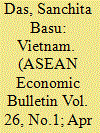

|
|
|
| 13 |
ID:
088798
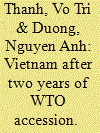

|
|
|